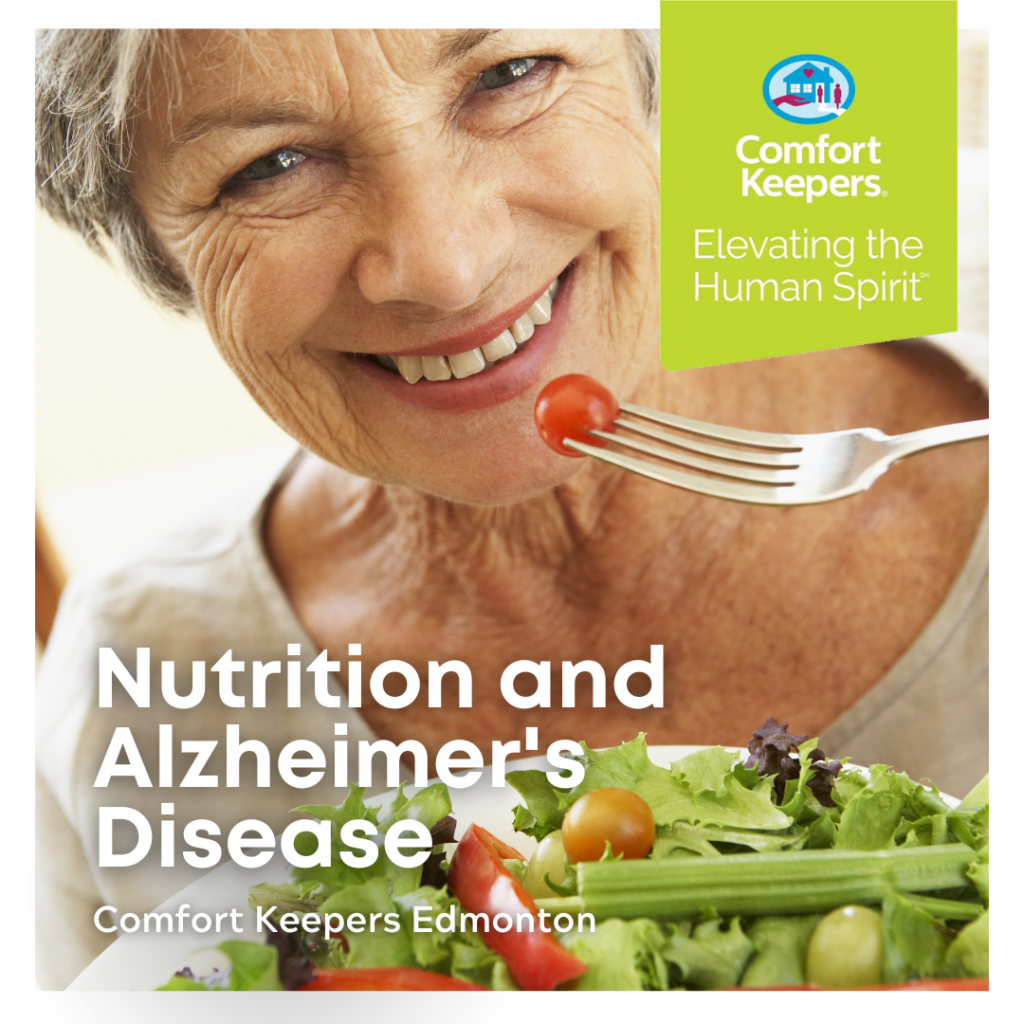Senior Nutrition & Alzheimer’s Disease
Alzheimer's and Dementia Care | January 11, 2023

What Every Senior in Edmonton, AB, Needs to Know About Nutrition & Alzheimer’s Disease
What do you need to know about nutrition & Alzheimer’s disease? Food is fuel for the body like gasoline is to a car. What you put into your body directly affects how your body works. Food and nutrition play a vital role in our overall health. Healthy foods help our bodies to grow, fight off disease, and function on a cellular level. Diet has long been correlated with causing, preventing, and managing maladies of the human body, and Alzheimer’s is no exception.
What Is Alzheimer’s Disease?
Many seniors face a growing number of health problems as they age. One particularly concerning disease is Alzheimer’s. Alzheimer’s is a progressive, incurable, fatal disease that usually strikes the elderly but can occur as young as 40.
Alzheimer’s Disease and Dementia
Dementia is a term for several diseases affecting memory, intellectual ability, and everyday activities. Alzheimer’s disease is the most common subclass of dementia. Alzheimer’s disease in particular causes memory loss and affects the thinking and behavior of those who suffer from it.
Risk Factors For Alzheimer’s
Currently, Alzheimer’s disease affects more than 747,000 Canadians – that’s 14.9 per cent of Canadians 65 and older. There are a number of risk factors for this disease that the general public is aware of, including head injuries, genetics and a family history. However, one risk factor that does not seem to get as much media attention is the possible link between Alzheimer’s disease and vascular disease.
Nutrition & Alzheimer’s Disease
The human brain is fed nutrients and oxygen by the vascular system. If the vascular system is not functioning well, the brain is also deprived of essential nutrients and oxygen, which can cause disease in the brain, including dementia. Research shows that the same risk factors for vascular disease–diabetes, hypertension, and high cholesterol–are also risk factors for Alzheimer’s.
Reducing Your Risk of Alzheimer’s Disease
While a person may not have any control over genetics or family history, he or she can take action that may reduce the risk of acquiring Alzheimer’s disease, including following a brain-healthy diet.
The Alzheimer’s Association defines a brain-healthy diet as “one that reduces the risk of heart disease and diabetes, encourages good blood flow to the brain, and is low in fat and cholesterol.” They recommend increasing the intake of foods that can protect brain cells.
Tips for Senior Nutrition & Alzheimer’s Disease
Senior Nutrition & Alzheimer’s Disease and Antioxidants:
According to Alzheimer’s Association, Adopt a Brain-Healthy Diet, dark-skinned fruits and vegetables have the highest levels of naturally occurring antioxidant levels. Such vegetables include kale, spinach, brussel sprouts, alfalfa sprouts, broccoli, beets, red bell pepper, onion, corn, and eggplant.
Fruits with high antioxidant levels include prunes, raisins, blueberries, blackberries, strawberries, raspberries, plums, oranges, red grapes, and cherries.
While studies have not been able to definitively state exactly how much of these brain foods are required to have a noticeable affect on a person’s risk of acquiring Alzheimer’s disease, there are some data that show that older women who eat primarily leafy green and cruciferous vegetables demonstrate mental functioning that is two years younger than their counterparts who do not eat many of these vegetables. Therefore, incorporating as many of these brain-healthy foods into the diet as possible is recommended.
Senior Nutrition & Alzheimer’s Disease and Omega-3:
Consume cold-water fish (halibut, mackerel, salmon, trout and tuna) contain beneficial omega-3 fatty acids.
Senior Nutrition & Alzheimer’s Disease and Vitamin E:
Some nuts can be a useful part of the diet; almonds, pecans and walnuts are a good source of vitamin E, an antioxidant.
Following a brain-healthy diet, along with being socially and physically active, limiting the intake of alcohol and maintaining a healthy weight, could very well mean the difference between acquiring Alzheimer’s or other forms of dementia or aging gracefully.
Nutrition & Alzheimer’s Disease for the Senior Patient
It is also vitally important that seniors who already have Alzheimer’s disease practice healthy nutritional habits to help them stay healthy and independent as long as possible. Foods high in cholesterol, saturated fat, sodium, and refined sugar should be greatly limited or eliminated. They should also eat a good variety of foods to ensure an adequate nutritional balance.
Nutrition & Alzheimer’s Disease Obstacles for Seniors
An additional problem that needs to be accounted for, however, is that Alzheimer’s patients may be faced with additional challenges that interfere with maintaining a healthy diet. As the disease progresses the person may have difficulty with dexterity and may not be able to handle cutlery and utensils easily; the person may not recognize foods or may forget when he or she last ate.
Other obstacles to eating well include mouth pain due to poor-fitting dentures or other mouth problems the person is not able to communicate; lack of exercise, which reduces the appetite; a reduced sense of taste and smell; medications that interfere with the appetite; changes in perception that make it difficult for the person to distinguish food from a plate; and distractions that keep the person from eating.
To overcome these obstacles, caretakers can apply a number of approaches to ensure their loved one or client gets the nutrition he or she needs.
9 Tips and Strategies from the Alzheimer’s Association:
Tip #1 – Contrasting colours:
Distinguish food from the plate and the plate from the table by using contrasting colors for plates and placemats. This can help the food to stand out and become identifiable to someone whose perceptions are dramatically altered.
Tip #2 – Temperature control:
Make sure that food and drink are at an edible or drinkable temperature to ensure the person does not burn his or her mouth. Test them before giving them to the Alzheimer’s patient.
Tip #3 – Finger foods:
Make eating easy by providing finger foods that are easy to pick up.
Tip #4 – Simplicity:
Avoid distraction and confusion by only serving two foods at a time.
Tip #5 – Individual preferences:
Let the person eat according to his or her preferences. Keep these preferences in mind and serve foods that the person has liked in the past so that the meal is more appetizing to him or her. If the person’s preferences suddenly change, change the foods and do not try to force him or her to eat foods he or she may no longer like.
Tip #6 – Patience:
Allow the person as much time to eat as he or she needs. Because of limited abilities, he or she may take an hour or more to finish a meal.
Tip #7 – Independence:
Allow the person as much independence as possible, even if he or she makes a mess, and adapt the plates, cups and utensils to accommodate his or her abilities. Bowls may be easier for the person to use than plates, and cups with suction cups on the bottom may aid in preventing spills
Tip #8 – Interactive meals:
Make the meals pleasurable by joining the person at mealtime. Engage him or her in conversation to stimulate the brain and appetite. You can also show the person how to eat as necessary through demonstration.
Tip #9 – Portion control:
If the person forgets when he or she last ate and keeps requesting a meal, break up that meal into several little meals so the person can eat each time he or she wants to without overeating. Portion out the different foods and provide them to the person over the course of the day as he or she asks for them.
For additional tips and information, and some great caregiver guides, visit the Alzheimer Society of Canada website.
Comfort Keepers® Edmonton is Proud to Offer a Wide Range of Home Senior Care Services
Our trained caregivers will ensure your loved one is comfortable, independent and safe in their home. On top of that, we will also aim to enhance their overall health, quality of life and general happiness.
Top-Notch Home Healthcare for Seniors in Edmonton, Alberta
Comfort Keepers of Edmonton offers a wider range of senior care services. We offer retirement care, respite care, senior care, companionship care, end-of-life care, post-surgery care, palliative care, personal care, and senior living transition services. If you are concerned about the health and well-being of your aging loved ones we can help with 24-hour care and more!
Helping Seniors Age-in-Place with Companionship Care and Interactive Caregiving™
Empathetic care starts in the heart and allows us to meet our client’s needs. Our trained caregivers are selected with one specific quality in mind, empathy. We strive to stimulate our clients emotionally, mentally and socially, thus enhancing their overall quality of life.
Our Interactive Caregiving™ provides a system of care that addresses companionship, safety, nutrition, mind, body, and activities of daily living (ADLs). The system increases seniors’ sense of well-being, independence and companionship by focusing on Senior Mind, Senior Body, Senior Nutrition, and Senior Safety.
Affordable and Client-Directed Homecare is Available for Qualifying Albertans
Comfort Keepers® Edmonton is an Approved Service Provider for the Client Directed Homecare Invoicing (CDHCI) Program Offered by Alberta Health Services.
What is the Client Directed Home Care Invoicing Program (CDHCI)?
CDHCI is a great program provided by Alberta Health Services (AHS), allowing clients to choose an approved agency like, Comfort Keepers Edmonton for Personal Care, Respite Care and Homemaking needs. The chosen agency can then bill AHS directly for services rendered for approved hours through Alberta Blue Cross. Read more about the program HERE.
Accredited Home Care Edmonton
Comfort Keepers® Edmonton was awarded the “Accredited with Exemplary Standing” seal by Accreditation Canada. This honour demonstrates Comfort Keepers’ commitment to offering safe, high-quality home care to its senior clients in Edmonton, AB.
To learn more about senior in-home care in Edmonton, contact the Comfort Keepers® office. Our service territory includes Edmonton, Devon, Sherwood Park, Stony Plain and surrounding areas, contact the Comfort Keepers Edmonton office at 780-465-4665.
References:
Alzheimer’s Association. (n.d.). Adopt a Brain-Healthy Diet. Retrieved from http://www.alz.org/we_can_help_adopt_a_brain_healthy_diet.asp
Alzheimer’s Association. (n.d.). Alzheimer’s Facts and Figures. Retrieved from https://www.alz.org/alzheimers_disease_facts_and_figures.asp
Alzheimer’s Association. (n.d.). Food, Eating and Alzheimer’s. Retrieved from https://www.alz.org/care/alzheimers-food-eating.asp
Individualized Home Care Options
Long-Term Home Care, 24 Hour Home Care & Short Term Care Options Customized for You







